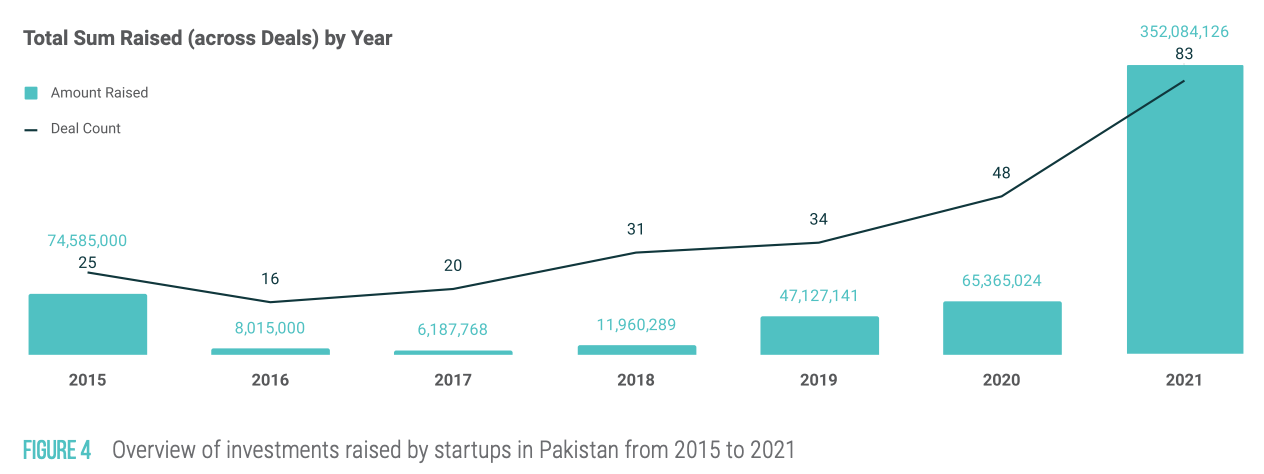2021 was a blockbuster year for Pakistani startups, which raised a total of US$352 million, data from Invest2Innovate, a local consultancy firm, shows. Out of that sum, 27% was raised by fintech startups, or US$95 million (excluding Bazaar’s combined US$36.5 million raised in 2021), showcasing investors’ growing appetite for the country’s nascent fintech sector.

Total sum raised across deals by year, Source: Pakistan Startup Ecosystem Report 2021, Invest2Innovate, March 2022
So far in 2022, it appears that the momentum will likely continue, with several considerable rounds announced in Q1. These include Taro Technologies’ US$3.5 million pre-seed funding, NayaPay’s US$13 million seed round, and Bazaar’s US$70 million Series B.
Bazaar is a B2B e-commerce platform founded in 2020 that connects retailers directly with wholesalers and manufacturers. Bazaar provides a suite of digital products to help merchants simplify and grow their businesses, through commerce and fintech solutions.
Taro Technologies is a young startup that was founded just last year. It’s looking to launch a buy now, pay later (BNPL) venture in Pakistan. As part of its funding round, Taro Technologies has partnered with Dubai-based Cashew Payments, a BNPL provider in the Gulf Cooperation Council (GCC), to accelerate the launch of its product and growth.
NayaPay provides a multi-service messaging and payment. It comes with an accompanying Visa debit card, and features free messaging and money transfers to friends and family members through chat, detailed transaction logs, instant notifications, and more.
NayaPay was the first fintech of its kind in Pakistan to secure an e-money Institution license from the central bank, the State Bank of Pakistan. The company is now expanding beyond the retail segment and building a payment platform for small and medium-sized enterprises (SMEs). It aims to accrue 5 million customers and 300,000 merchants within the next five years.
NayaPay’s US$13 million seed round is the second largest funding round ever raised by a fintech-focused Pakistani startup, second only to QisstPay’s US$15 million seed round announced in Q3 2021, data from Invest2Innovate show.
The rise in fintech startup funding in Pakistan comes as investors around the world are growing increasingly interested in developing nations. They are betting on the growth prospects of digital payments as more people embraced digital services during the pandemic. In Pakistan, only 1% of almost US$4 trillion of payments are made digitally, leaving plenty of room for the space to grow.
Recent industry developments
Pakistan has a relatively small and nascent fintech market. This is despite the country’s large population of unbanked and opportunities for growth. Pakistan has the third largest unbanked adult population globally with about 100 million adults without a bank account, according to the World Bank. This number accounts for about 5% of the world’s unbanked population, which stands at 2 billion.
According to Raza Jafri, head of equities at Intermarket Securities, about 70% of the country’s population doesn’t have a bank account, and only 2.4% of Pakistanis have access to credit from formal financial sources, data from the State Bank of Pakistan show that.
But recent progress in the local startup ecosystem, including progressive regulatory regimes and new initiatives by the government, have encouraged the development of fintech startups and reduce barriers.
For instance, the central bank introduced back in 2019 a legal framework for Electronic Money Institutions (EMIs). Most recently, it launched licensing and regulatory framework for setting up digital banks in Pakistan, establishing clear capital requirements and a framework for the gradual rollout establishment of these new players. The SBP said it will initially be handing out five digital banking licenses.
The SBP also launched Raast, a fast digital payment platform similar to India’s United Payment Interface (UPI). With Raast, the central bank seeks to lower the cost of transactions and provide the foundation for fintech companies to build upon. Raast entered the 2nd phase of its rollout in February, introducing peer-to-peer (P2P) instant payments.
The Securities and Exchange Commission of Pakistan (SECP), meanwhile, issued in 2019 guidelines for its Regulatory Sandbox, a tailored regulatory environment that allows entities to conduct limited scale live tests of innovative products, services, processes, and business models in a controlled environment.








No Comments so far
Jump into a conversationNo Comments Yet!
You can be the one to start a conversation.